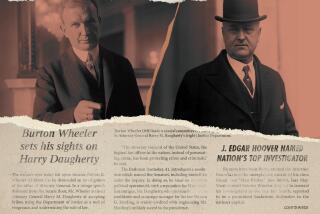U.S. Officials Pressured Halliburton to Buy Kuwaiti Company’s Oil, Documents Show
- Share via
WASHINGTON — Intervening in a heated business dispute, top U.S. officials exerted pressure to force Halliburton Corp. to buy allegedly overpriced fuel from a Kuwaiti company, according to State Department documents released today.
U.S. Ambassador to Kuwait Richard H. Jones urged the purchase of fuel from Altanmia Commercial Marketing Co. amid the Kuwaiti firms’ accusations that Halliburton officials were demanding kickbacks, smuggling oil and in one case forcing a hotel to buy a diamond-encrusted Cartier watch for an executive’s wife, the documents show. Halliburton had accused the company of failing to perform.
The fuel purchases by Halliburton’s subsidiary, KBR, are at the center of an ongoing FBI investigation into whether the Houston-based oil industry company overcharged U.S. taxpayers by $61 million for millions of gallons of fuel.
“Please tell KBR to get off their butts and conclude deals with Kuwait NOW!” Jones wrote in the December 2003 e-mail to an unnamed official. “Tell them we want a deal done with Altanmia within 24 hours and don’t take any excuses.”
The e-mails seemed to bolster Halliburton’s repeated contention that it tried to buy cheaper fuel from Turkey, but was instructed by the U.S. government to buy higher priced fuel from Kuwait.
The e-mails also raised questions about whether Jones and other U.S. officials had unfairly influenced the contracting process, which is supposed to be free from bias to protect taxpayer dollars. At least one government employee has previously complained about receiving “pressure” from higher-ups to order Halliburton to buy fuel exclusively from Altanmia.
Rep. Henry Waxman, a California Democrat who released some of the more than 400 documents today, demanded that the House Government Reform Committee hold hearings on Halliburton’s contracts with the U.S. government.
Democrats’ charges of favoritism and wrongdoing involving Halliburton played a key role in the presidential campaign because Vice President Dick Cheney was CEO of the company between 1995 and 2000.
“The elections are over, but the fact that U.S. taxpayers have been overpaying for the work done in Iraq is something that we still have to be concerned about,” Waxman said. “Even the Republicans should be concerned about it.”
A spokesman for Rep. Tom Davis, the Virginia Republican who chairs the committee, said Davis was considering the hearing request, but was still reviewing the documents given to the committee.
“To jump to conclusions as Mr. Waxman has done would be irresponsible,” said David Marin, a Davis spokesman. “We continue to ask question about the information.”
The e-mails offer the most complete account to date of the chaos and urgency that surrounded the controversial contract, which was worth up to $7 billion when it was awarded to Halliburton in March 2003 without competitive bidding.
Although U.S officials intended the contract to protect and repair Iraq’s oil infrastructure, they used it instead to instruct Halliburton to buy fuels like kerosene and gasoline to keep Iraqis from rioting over shortages.
To accomplish that mission, Halliburton signed an initial deal with Altanmia, a company with no previous experience in supplying fuel, soon after the U.S. invasion of Iraq.
By the summer of 2003, however, the two companies had gotten into a dispute over whether Altanmia had fulfilled its end of the bargain.
Altanmia officials approached the embassy and complained that Halliburton was planning to exclude it from a competition for a follow-up contract because it had refused to pay Halliburton executives kickbacks and bribes.
Altanmia General Manager Waleed Humaidhi later emphasized, however, that nobody from the company had directly asked for any “extra-contractual considerations.”
Hamidhi “said it was their asumption that ‘political’ or ‘kickback’ considerations must be behind KBRs complaint” about the company’s performance, according to one memo.
The State Department had no immediate response.
Wendy Hall, Halliburton’s director of public relations, said of Waxman’s allegations: “This appears to be nothing more than a retrospective look at all of the Congressman’s letters and news releases during the presidential campaign.”
“The facts show that KBR delivered fuel to Iraq at the best value, the best price, and the best terms and in ways completely consistent with government procurement policies,” she said in a written response. “The original mission detailed by the Army Corps of Engineers was to find a fuel source in the region. The first fuel source found was in Kuwait. KBR initiated the idea to source fuel from Turkey. KBR presented this idea to its customer, and because of this, saved taxpayers well over $100 million.”
“Most importantly, this plan allowed the Iraqi people to get the fuels they need, while ensuring KBR subcontractors and employees had a less hazardous and closer route to Baghdad,” she said.
More to Read
Sign up for Essential California
The most important California stories and recommendations in your inbox every morning.
You may occasionally receive promotional content from the Los Angeles Times.













